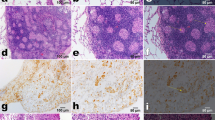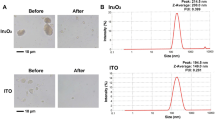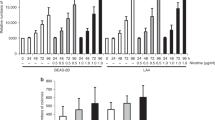Abstract
THE ability of cells in human tissues to metabolise procarcinogens into oncogenic metabolites may be one important determinant in organ and host susceptibility to environmental carcinogens. Metabolic activation of polynuclear aromatic hydrocarbons (PNH) seems to be required before they can cause neoplastic transformation of cells either in vivo or in vitro1,2. This activation may involve the production of a metabolite(s) capable of tight binding to cellular macromolecules including DNA. The binding level of PNH to macromolecules generally shows a good correlation with their oncogenicity in experimental animals and cells in culture3–6, although exceptions exist7. Whether or not this correlation exists in man is unknown.
This is a preview of subscription content, access via your institution
Access options
Subscribe to this journal
Receive 51 print issues and online access
$199.00 per year
only $3.90 per issue
Buy this article
- Purchase on Springer Link
- Instant access to full article PDF
Prices may be subject to local taxes which are calculated during checkout
Similar content being viewed by others
References
Miller, J. A., Cancer Res., 30, 559–576 (1970).
Heidelberger, C., Adv. Cancer Res., 18, 317–366 (1973).
Brookes, P., Cancer Res., 26, 1994–2003 (1966).
Brookes, P., and Lawley, P. D., Nature, 202, 781–784 (1964).
Marquardt, H., et al., Cancer Res., 32, 716–720 (1972).
Duncan, M. E., and Brookes, P., Int. J. Cancer, 6, 496–505 (1970).
Rayman, M., and Dipple, A., Biochemistry, 12, 1538–1542 (1973).
Kaufman, D. G., Genta, V. M., Harris, C. C., Smith, J. A., Sporn, M. B., and Saffiotti, U., Cancer Res., 33, 2837–2841 (1973).
Harris, C. C., et al., Cancer Res., 33, 2842–2848 (1973).
Leibovitz, A., Am. J. Hygiene, 78, 173–180 (1963).
Parker, R. C., N. Y. Acad. Sci., 5, 303–312 (1957).
Boren, H., Wright, E., and Harris, C., Methods in Cell Biology (edit. by Prescott, D.), 8, 277–288 (Academic Press, New York, 1974).
Brookes, P., and Duncan, M. E., Nature, 234, 40–43 (1971).
Crocker, T., O'Donnell, T., and Nunes, L. L., Cancer Res., 33, 88–93 (1973).
Lasnitzki, I., Br. J. Cancer, 10, 510–516 (1956).
Harris, C., Seminars in Oncology, 1, 163–166 (1974).
Clamon, G. H., et al., Nature, 250, 64–66 (1974).
Author information
Authors and Affiliations
Rights and permissions
About this article
Cite this article
HARRIS, C., GENTA, V., FRANK, A. et al. Carcinogenic polynuclear hydrocarbons bind to macromolecules in cultured human bronchi. Nature 252, 68–69 (1974). https://doi.org/10.1038/252068a0
Received:
Issue Date:
DOI: https://doi.org/10.1038/252068a0
This article is cited by
-
Molecular epidemiology of smoking and lung cancer
Oncogene (2002)
-
The p53 network in lung carcinogenesis
Oncogene (2002)
-
Aryl hydrocarbon hydroxylase induction levels in patients with malignant tumors associated with smoking
Journal of Cancer Research and Clinical Oncology (1984)
-
Detection of chemical carcinogens by assay of unscheduled DNA synthesis in rat tracheal epithelium in short-term organ culture
Journal of Cancer Research and Clinical Oncology (1981)
-
Benzpyrene-Induced sister chromatid exchanges in lymphocytes of patients with lung cancer
Human Genetics (1977)
Comments
By submitting a comment you agree to abide by our Terms and Community Guidelines. If you find something abusive or that does not comply with our terms or guidelines please flag it as inappropriate.



